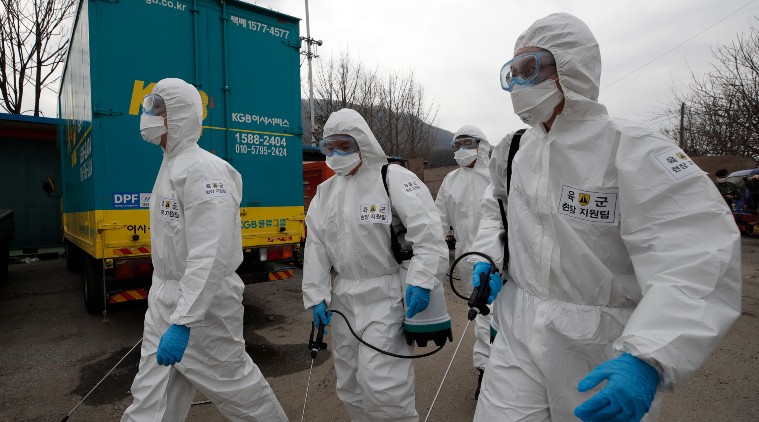 South Korean soldiers wearing protective gears walk to spray disinfectant as a precaution against the new coronavirus in Seoul, South Korea. (AP Photo/Lee Jin-man)
South Korean soldiers wearing protective gears walk to spray disinfectant as a precaution against the new coronavirus in Seoul, South Korea. (AP Photo/Lee Jin-man)
The World Health Organisation has issued a notice warning people about cybercriminals posing their representatives and trying to trick people into downloading malicious software or stealing their login credentials. The cybercriminals claim to offer safety measures against Coronavirus via emails, phone calls, text messages, fake websites in order to steal sensitive information from users, according to WHO’s notice.
The Coronavirus has claimed a total of 3,117 lives worldwide and with two freshly reported cases in India, the widespread disease now has more than 90,000 confirmed cases across the world. The World Health Organisation classified the COVID-19 as a global emergency. Previously, Check Point Research and Quick Heal had warned against the use of the coronavirus scare to send malicious links to users.
Another report by security firm Mimecast highlights how scammers are sending phishing emails to people using similar tactics.
WHO warns against Coronavirus cyber threats
WHO issued a notice informing people about ongoing identity theft using the coronavirus as a bait. “Criminals are disguising themselves as WHO to steal money or sensitive information,” it said. “If you are contacted by a person or organisation that appears to be from WHO, verify their authenticity before responding.”
Express Tech is now on Telegram. Click here to join our channel (@expresstechie) and stay updated with the latest tech news
WHO said that it will never ask users to login in order to view safety information or send an email attachment that they didn’t ask for in the first place. Users are warned against visiting any links other than the official http://www.who.int.
WHO does not conduct lotteries, charge money to apply for a job, register for a reference, or reserve a hotel. Nor is the organisation asking users to donate directly to emergency response plans or funding appeals. This is another trope that cybercriminals could use in light of the recent health emergency.
In case you receive an email, phone call, text message, or fax message claiming to be from WHO, you can directly contact the organisation to verify if the communication is legitimate.
You can also go to this link directly to report a suspected scam. You will need to enter your name, country, and email along with the complaint.
WHO warning against Phishing emails
The organisation has also issued some steps to keep in mind when dealing with any suspicious email, which claims to offer help or safety tips about the 2019 novel coronavirus. The global outbreak of the disease is encouraging scammers to send phishing emails, where they try and trick users into giving up important information.
The email, which claims to be from WHO, will ask for sensitive information, such as usernames or passwords. Or it could direct users to click a malicious link or open a malicious attachment. In order to prevent phishing, users should verify the email address of the sender.
Emails from WHO have the email address which reads as ‘name@who.int’ Anything other than ‘who.int’ after the ‘@’ symbol means the sender is not from WHO. The official organisation does not send emails from addresses ending in ‘@who.com’ , ‘@who.org’ or ‘@who-safety.org’.
It is also asking users to go directly to the WHO website, rather than clicking on links in emails or messages.